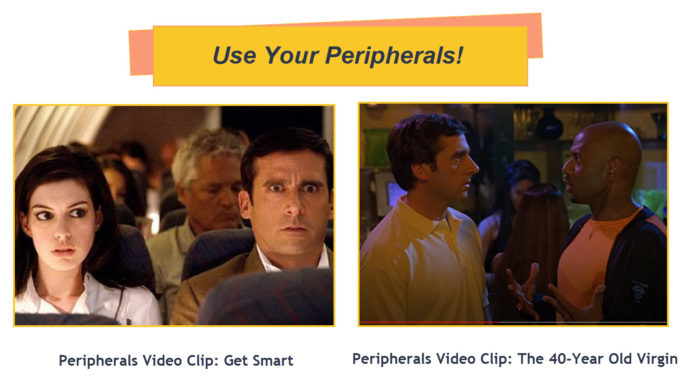
Who said it best? Get Smart or The 40-Year Old Virgin?
When you’re targeting SEO, there is a lot you must take into account. Foundational SEO elements when you’re just starting out…. competitive SEO elements when your competitors are savvy….and advanced SEO elements when you’ve hit a plateau.
Besides the factors that directly contribute to SEO—page load time, SSL encryption, unique keywords in title tags, on-page optimization, quality backlinks—there are many indirect, peripheral activities you must also take into account.
Peripheral activities include:
- Brand mentions
- Social media signals
- CTR
- and of course, UX and UX design
How Does UX Affect SEO?
How does user experience affect SEO?
UX is a critical piece of your SEO strategy in two ways. First, because qualified traffic that bounces from your site because of a poor experience is a waste of all that SEO effort. And second, because Google is explicitly looking for engagement signals to show that you are a high-quality website deserving of being at the top.
Let me explain the first point.
A few years ago, after a WordCamp Atlanta SEO talk, a web designer who was in the crowd came up to me afterward and asked, “Clients always expect SEO comes along with web design. So how do I explain where web design stops and SEO starts”?
Ah. Such a good question.
Here is my answer: technically, SEO’s job is to DRIVE traffic to a website. But once the visitor gets to the site, the website marketing plan takes over.
And if they’re not both aligned and synergistic, you’re going to get high bounce rates, pogosticking, and traffic tourists (people who come to your site, leave, and never come back).
All that SEO work, wasted. (shakes head in sadness).
Y’all. I beg you. There are too many tears and sweat equity that come along with SEO to let that hard-earned traffic not convert.
And when you couple the desire to not want to waste effort with the fact that we searchers today have no attention span, we’re impatient, demanding, and have high expectations, you better suit up and rise to the challenge.
I would not be in SEO today if I didn’t carry recommendations through to the conversion and call to action point. SEO is not going to get resources – budget and workload hours – if it doesn’t result in growth. You can’t ignore UX if you’re charged with SEO.
That’s the first problem that comes with not paying peripheral attention to the user experience and conversion path.
How Important is UX for SEO?
How important is UX for SEO? 10 years ago, not important. This is why spammy websites easily manipulated their way up the rankings. Which is why today, Google takes measuring the on-site experience very seriously.
The second way that UX affects SEO, is that Google is specifically looking for signals to show that your users are having a smooth—and dare I say pleasant? —experience on your site.
The algorithm has evolved a thousand different ways – and continues to evolve – to rank sites with the best UX.
TLDR: SEO has progressed beyond just direct SEO elements. That is so 2005. Ignore UX at your peril.
SEO |